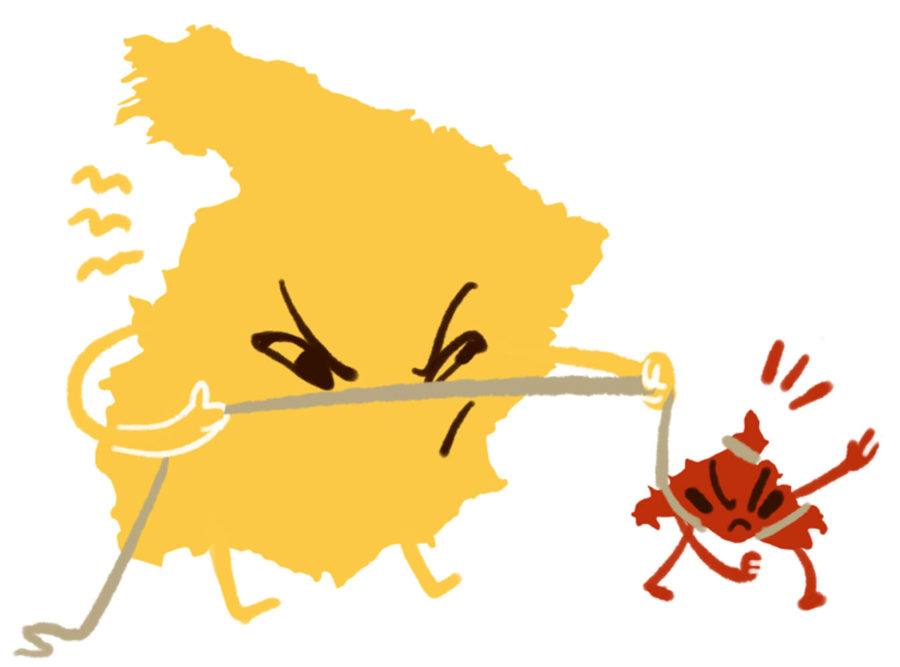Voters tried to take to the polls in Catalonia Oct. 1 for a landmark independence referendum in the Spanish autonomous community — but the day ended in chaos. Spanish police brought in from outside Catalonia by the Spanish government injured more than 800 Catalan citizens in conflicts across the region.
After the unrest settled, Carles Puigdemont, president of Catalonia, declared his region’s independence but then confusingly revoked it in an Oct. 10 speech. In response to Puigdemont, Spanish Prime Minister Mariano Rajoy claimed the confusion was “deliberate” and that Catalonia would be “formally required” to confirm whether it had declared independence.
Although Spain’s top court declared the referendum illegal and against the Spanish Constitution, the nation did not yet invoke a Constitutional clause that would permit it to suspend Catalonia’s autonomy — and it’s best that they don’t. Regardless of the result of any potential referendum, Spain and the rest of the world must respect Catalans’ identity and political right to self-governance.
Requiring Catalonia to confirm whether it declared independence puts the residents in a tough spot. According to Reuters, the region is at risk of losing its support from the far-left political party Popular Unity Candidacy. Catalans now must decide if they should remain part of a nation that supports brutal police and undermines its autonomy.
The tumultuous relationship between Catalonia and Spain began in 1469, when Catalonia became part of Spain because of a royal marriage. Catalonia even once seceded from Spain, although its constitution was abolished in 1714 by the Spanish government.
But Catalonia is a very distinct region. Many Catalans, although citizens of Spain, usually speak Catalan as their primary language instead of Spanish — in 2001, 75 percent of Catalans fit into this category. Catalan is a language closer to French and Italian than to Spanish, which marks a major cultural difference between the two populations.
Historically, Catalans have been oppressed by Spain for using their native language. Fascist dictator Francisco Franco actively sought to stamp out Catalan culture and institutions during his time in power from 1936 to 1975, undermining Catalan culture and intensifying anger toward Spain.
It was only in 1978, at the end of the Franco regime, that Catalan was legal again and the region’s cultural and political institutions were given more autonomy.
The linguistic conflict between Spain and Catalonia still rages on. A landmark Spanish Constitutional Court decision in 2010 ruled Catalan could not be officially listed as the primary language over Spanish in Catalonia. And separatist parties in Catalonia garnered 48 percent of the vote in the 2015 Spanish parliamentary elections compared to 40 percent support for pro-Spanish Parties.
Support for independence continues to grow. Despite the violence and disruptions during the democratic referendum Oct. 1, a clear majority emerged with 90 percent of voters casting yes votes for independence.
In recent history, European referendums serve to gauge public interest on a proposal. The recent “Brexit” referendum in the United Kingdom asked its citizens whether or not they should leave the European Union. Venice had a referendum in 2014 regarding Venetian independence. Neither resolution was marred by violence, and both enabled their governments to have greater understandings of citizens’ views.
But even in the face of police brutality, the Spanish government offered no assistance. In a rare televised address to the nation, Spanish King Felipe VI condemned the Catalan voters and said, “They have broken with the principles of democracy that every nation state of law adheres to.”
Catalonia, however, has not broken with any principle of democracy. All Catalonia did was attempt to stage a referendum on independence to gauge citizens’ opinions on an issue. Spain responded as it would to criminals, and in doing so did nothing to help its efforts to retain Catalan as its territory. No nation should blindly turn arms against its own citizens — that is a break from the “principles of democracy every nation state of law adheres to.”
Issues of independence in Europe are complex due to long histories of involvement and the historic building of political and economic institutions. For that reason, many regions similar to Catalonia, like Venice and Scotland, decided against independence. Being tied to a larger, supposedly more established and successful, economy can help save small nations in times of trouble.
But in the end, it should not be up to us or Spain alone to decide if Catalonia has the right to declare independence. We have a democratic obligation to recognize legitimate expressions
of desire for self-determination, so our role is to help foster a world where important dialogues concerning freedom can take place.
Spain’s role, on the other hand, requires far more listening. The nation must carefully choose how it decides to impose power over Catalonia — continuing to do so violently, as was done Oct. 1, could alienate Spaniards in Catalonia from their identity. To have a happy, prosperous nation, citizens must feel cared for and welcomed. Spain should support a legitimate and safe referendum before engaging in reconciliatory and compromising conversations surrounding the complex issue of Catalan independence.


